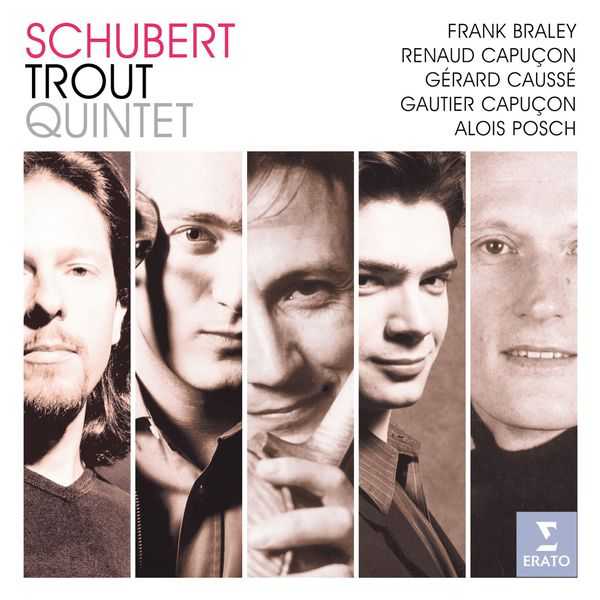
Composer: Franz Peter Schubert
Performer:Frank Braley, Renaud Capuçon, Gérard Caussé, Gautier Capuçon, Aloïs Posch
Format: FLAC (tracks)
Label: Erato
Catalogue: 5455632
Release: 2004
Size: 231 MB
Recovery: +3%
Scan: cover
Piano Quintet in A Major, Op. Posth. 114, D. 667 “The Trout”
01. I. Allegro vivace
02. II. Andante
03. III. Scherzo. Presto
04. IV. Tema con variazione. Andantino
05. V. Finale. Allegro giusto
Introduction and Variations, Op. Posth. 160, D. 802 “Trockne Blumen”
06. Introduction
07. Thema. Andantino
08. Variations I – VII
09. Am Tage Aller Seelen, D. 343 “Litanei auf das Fest Aller Seelen”
A memorable account of the Trout Quintet. This group may not project the warmth and bonhomie of the famous Curzon/Boskovsky recording, nor does it have the searching quality of the performance led by Alfred Brendel, but for verve and refinement it’s hard to beat. The happy, carefree nature of the music is captured perfectly on a beautifully clear recording; it’s especially notable how every detail of the double bass’s very spirited contribution, is clearly heard yet with no sense that Alois Posch is ‘bringing out’ his part. Especially enjoyable is the Scherzo – a fast tempo, but finely poised, and with a subtle, effective relaxation of the trio – and the Variations.
In Variation 2 Renaud Capuçon’s figuration is so delicate that the viola melody can create a particularly strong expressive effect, and the following variation is just as magical – Frank Braley’s demisemiquavers are quite brilliant, with a lovely, silvery tone, and the bass melody has, for once, nothing elephantine about it.
The elaborate, showy set of variations on ‘Trockne Blumen’ from Die schöne Müllerin, dating from 1824, is an unhackneyed choice of filler. It’s curious that the current catalogue lists only two recordings, and one of these, like the present version, substitutes violin for the original flute. It certainly makes a virtuoso violin and piano piece, and played with the precision and delicacy that Capuçon and Braley bring to it is highly effective, though with only occasional touches of the melancholy we expect in late Schubert. After this extravagant music, the touching simplicity of the song arrangement is the more striking.